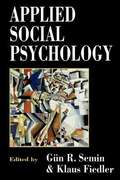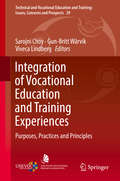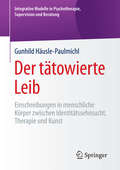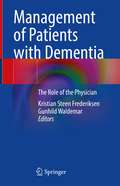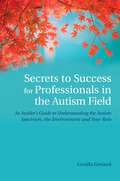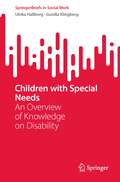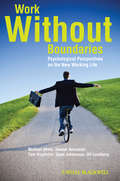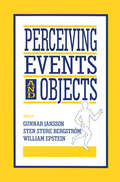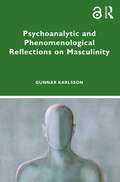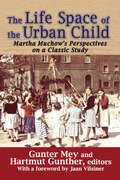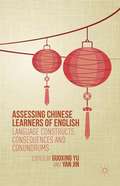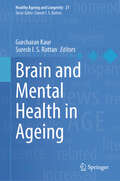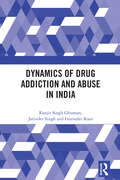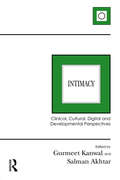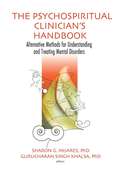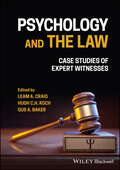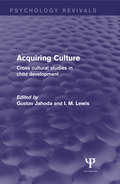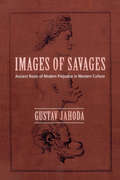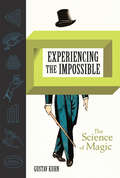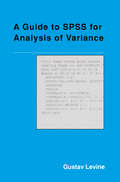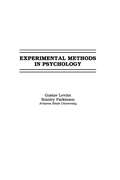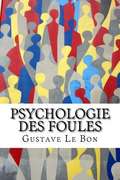- Table View
- List View
Applied Social Psychology
by Gun R. Semin Klaus FiedlerThis comprehensive textbook overviews the applications of social psychology to a wide range of problems and issues in contemporary society. With internationally respected contributors who survey the major developments in their fields, this practical guide incorporates advice, examples and reading lists.
Integration of Vocational Education and Training Experiences: Purposes, Practices and Principles (Technical and Vocational Education and Training: Issues, Concerns and Prospects #29)
by Sarojni Choy Gun-Britt Wärvik Viveca LindbergThis book draws on experiences from a range of vocational education systems in different nation states and re-examines the purpose of providing experiences outside educational institutions; the kinds and extent of those experiences; and efforts made to ensure the integration of students’ experiences across sites. Analyses of the various vocational education systems, their purposes and practices across nations, and challenges experienced by different stakeholders illustrate different approaches to the integration of learning at different sites. The book includes a consideration of what constitutes the integration and reconciliation of experiences, and their attendant educational implications. This extends an appraisal of the concepts of integration, reconciliation, curriculum and work readiness, each of which has a range of connotations. Integration or reconciliation is differentiated from transfer of learning, which is commonly based on simple assumptions that the educational institutions will provide theory and that the workplaces will provide practice from the workplaces, and that the two can be easily linked by students. The contributions from different nation states clearly demonstrate that integration is a collaborative process and requires the agency of stakeholders operating at global, national and specific learning site levels.
Online-Self-Assessments zur Studienfachwahl: Entwicklung - Konzepte - Qualitätsstandards
by Gundula Stoll Susanne WeisDieses Buch befasst sich praxisnah mit Online Self-Assessments (OSA), die an Hochschulen zur Unterstützung der Studienfachwahl eingesetzt werden. Es beschreibt die einzelnen Schritte im Prozess der OSA-Entwicklung – von der Auftragsklärung über die Identifikation von Anforderungen, Erfolgskriterien und relevanten Personenmerkmalen, die Konzeption der einzelnen OSA-Elemente und ihre technische Umsetzung, bis hin zur Evaluation.Für jeden Entwicklungsschritt werden konzeptuelle und methodische Grundlagen vermittelt, potenzielle Stolpersteine aufgezeigt, Qualitätsstandards abgeleitet, sowie Praxisbeispiele und Checklisten bereitgestellt.Dieses Buch ist ein Gemeinschaftswerk des Netzwerks Online Self-Assessment (NOSA).
Der tätowierte Leib: Einschreibungen in menschliche Körper zwischen Identitätssehnsucht, Therapie und Kunst (Integrative Modelle in Psychotherapie, Supervision und Beratung)
by Gunhild Häusle-PaulmichlDas Buch beschäftigt sich mit den Phänomenen der Tätowierungen am menschlichen Körper, welche im Sinnzusammenhang der transversalen Identitätsthematik und einer integrativtherapeutischen Perspektive auf Körperphänomene stehen. Die Tätigkeit des Tätowierens sowie das Tätowiert-Sein ist Kunst und wird im foucaultschen Sinne zu Lebenskunst. Tätowiertrends folgen neben künstlerischen auch marktwirtschaftlichen Interessen, eine Verkennung von Selbstwahrnehmungsprozessen kann die Folge sein. Exklusions- und Inklusionsprozesse weisen auf die Stellung der Tattooeigner/innen innerhalb sozialer Gemeinschaften hin. Verschiedene Perspektiven des Phänomens der Tätowierung werden beleuchtet und der Zusammenhang zur Praxis und Theorie der Integrativen Therapie hergestellt.
Management of Patients with Dementia: The Role of the Physician
by Gunhild Waldemar Kristian Steen FrederiksenThis book provides an overall introduction to the medical management of dementia with chapters dedicated to specific topics such as pain, epilepsy, vascular risk factors in dementia and review of medication, which are often not addressed in books on the subject, and thereby filling a gap in the field. Chapters are supplemented with cases to highlight key concepts and treatment approaches, and to provide the reader with the possibility to reflect on management options and the readers´ own current practice.This book is aimed at clinicians of different specialties (mainly neurology, psychiatry, geriatric medicine and general practice/family medicine) who manage patients with dementia on a regular basis, and thus provides useful guidance to be used in the clinic.
Secrets to Success for Professionals in the Autism Field: An Insider's Guide to Understanding the Autism Spectrum, the Environment and Your Role
by Gunilla GerlandGunilla Gerland's extensive experience of the autism spectrum means she is expertly placed to offer a fresh perspective on working with autism as well as a wealth of effective tools and interventions to use in practice. In a highly readable style, with many inspiring examples, this book offers original explanations of the impairments associated with autism, showing how to discover the root cause of behaviours that are challenging, not just how to manage them superficially. It looks objectively and non-judgementally at the common pitfalls and difficulties that autism professionals may encounter, explaining how to deal with these and transition to more effective working relationships. An important section on ethics and reflection equips the reader with the knowledge and skills needed to grow professionally in the field. Packed with original insights and practical, hands-on tools and strategies, this is essential reading for teachers, teaching assistants, support workers, counsellors, social workers and anyone else working with individuals of any age on the autism spectrum.
Secrets to Success for Professionals in the Autism Field: An Insider's Guide to Understanding the Autism Spectrum, the Environment and Your Role
by Gunilla GerlandGunilla Gerland's extensive experience of the autism spectrum means she is expertly placed to offer a fresh perspective on working with autism as well as a wealth of effective tools and interventions to use in practice. In a highly readable style, with many inspiring examples, this book offers original explanations of the impairments associated with autism, showing how to discover the root cause of behaviours that are challenging, not just how to manage them superficially. It looks objectively and non-judgementally at the common pitfalls and difficulties that autism professionals may encounter, explaining how to deal with these and transition to more effective working relationships. An important section on ethics and reflection equips the reader with the knowledge and skills needed to grow professionally in the field. Packed with original insights and practical, hands-on tools and strategies, this is essential reading for teachers, teaching assistants, support workers, counsellors, social workers and anyone else working with individuals of any age on the autism spectrum.
Children with Special Needs: An Overview of Knowledge on Disability (SpringerBriefs in Social Work)
by Ulrika Hallberg Gunilla KlingbergThere can be a lack of understanding of the vulnerable situation of children with disabilities and their families, even among professional caregivers whose mission is to protect the health and wellbeing of these children. Their respectful treatment should include knowledge, empathy, humanity, and an open and sympathetic dialogue. This book provides an overview of knowledge and literature review of children and adolescents with special care needs that contribute to the respect and understanding of children with disabilities and their families. It also explains possible reasons for different outcomes in research studies and why there is a lack of knowledge in some areas concerning these children. Research on children with disabilities is considerable but often can be difficult to access on many levels, which means it does not always benefit those who need this knowledge. This compact book addresses this by presenting the international research in the field in an understandable way for people who work with children with disabilities and their families. The authors provide a broad picture of the background, reality of life, opportunities for professional help and support, as well as outlook of these children and families. Among the topics covered:The Health and Well-being of Children with DisabilitiesThe Health and Well-being of RelativesOccupationOn the Road to AdulthoodChildren with Special Needs: An Overview of Knowledge on Disability is pertinent reading for students in all areas of health care (including nursing and psychology), social work, sociology, and education aimed at children and young people. The text also would be of interest to those who practice in these areas and/or encounter children with disabilities in their daily work.
Artificial Intelligence to Analyze Psychophysical and Human Lifestyle
by Sunil Kumar Sunil Gupta Gunjan Chhabra Pooja NagpalThis book is about the use of technology/artificial intelligence in the areas of human behavior and psychology, health and nutrition, and fitness and sports. Everybody has his/her own lifestyle but may not necessarily be aware of what constitutes a healthy lifestyle. Knowledge gained from the Internet may be scattered and inaccurate and, if adhered to, may lead to loss of life. The COVID-19 pandemic increased people's awareness of the need for a healthy lifestyle but how to adopt a healthy lifestyle is something to be clarified since every individual is different (body type, situation, etc.), and hence, their needs will be different as well. This book addresses such questions and explores how the use of technology in the areas mentioned above can enable each individual to easily achieve a healthy lifestyle.
Work Without Boundaries
by Michael Allvin Gunn Johansson Gunnar Aronsson Tom Hagström Ulf LundbergDrawing on more than a decade of inter-disciplinary research, this book provides a comprehensive overview of the available theories, concepts, data and research on new work organizations and the concept of 'work without boundaries'.Explores a concept of work that is not restricted by traditional organizational rules like regular office hours, a single workplace, fixed procedures and limited responsibilityProvides a comprehensive overview of the available theories, concepts, data and research on new work organizationsExamines the shift of power away from organizations to make individuals accountable for their own employability and workDraws on over a decade of original research into 'work without boundaries' in which the authors are key authoritiesBrings together organization theory and work psychology with scholarship from related fields including sociology, social psychology, cognition and psychobiology
Perceiving Events and Objects
by William Epstein Gunnar Jansson Sten Sture BergströmBeginning with his doctoral dissertation in 1950 which introduced the study of event perception and the application of vector analysis to perception, Gunnar Johansson has been a seminal figure in the field of perception. His work on biomechanical motion in the 1970s challenged conventional notions and stimulated great interest among experimental psychologists and students of machine vision. In 1989 Johansson published his latest theoretical synthesis, the optic sphere theory, an innovative conceptualization that goes beyond his earlier proposals. This volume presents -- for the first time -- an extensive precis of the out-of-print classic 1950 monograph prepared by Johansson. It also includes a representative set of Johansson's important publications produced over the ensuing four decades. These papers served as the springboard for a set of original essays by a distinguished group of North American and European scientists. Part critical commentary, part elaboration, and part seeking new directions, the entire collection makes for a singularly rich treatment of the perception of objects and events.
Psychoanalytic and Phenomenological Reflections on Masculinity
by Gunnar KarlssonIn this highly original volume, Gunnar Karlsson offers new answers to the question concerning the relationship between belonging to a specific sex as a male and striving for a masculine identity. This book offers a uniquely psychoanalytic and phenomenological perspective on masculinity. Karlsson considers masculinity and traditional masculine ideals through a psychoanalytic lens before taking phenomenological concepts to chisel out the relationship between sex and gender. This perspective is developed throughout the volume to inspire readers to further their understanding of traditional gender assignment – female, male and intersex – in light of gendered characteristics such as femininity and masculinity. Chapters span topics such as the characteristics of typical, so-called “phallic masculinity”, its allure and psychogenetic explanation, as well as looking at what phallic masculinity disregards. Throughout, Karlsson maintains that phallic masculinity is unattainable, as it seeks to escape the existential conditions of helplessness, vulnerability, and dependence. He makes the case for the importance of considering the notion of ego-identity in the field of sex/gender studies, encouraging a liberation from gender stereotypes. Psychoanalytic and Phenomenological Reflections on Masculinity will be of great interest to researchers, clinical psychoanalysts and psychotherapists, as well as anyone interested in masculinity, gender studies and the relationship between sex and gender.
The Life Space of the Urban Child: Perspectives on Martha Muchow's Classic Study
by Gunter MeyThe heart of this book is the translation of The Life Space of the Urban Child, written in 1935 by Martha and Hans Heinrich Muchow. Life Space provides a fresh look at children as actors and how they absorb their city environments. It uses an empirical base connected with theories about the worlds in which children live. The first section provides historical background on Muchow's study and the author. The second section presents the translation of the Life Space study, as well as comments from an environmental psychologist's perspective. The third section reviews the study's theoretical foundations, including the concept of "critical personalism," the perspectives of phenomenology, and the notion of Umwelt (environment). The last section addresses various lines of research developed from the Life Space study, including Muchow's work in describing children in urban environments, methodological approaches, and the significance of space in social science and educational contexts. The manner in which Martha Muchow conducted her studies is itself of note. She obtained access to the children in their environments and combined observation with cartographies and essays produced by the children. This approach was new at the time and continues to inspire researchers today. This volume is the latest work in Transaction's History and Theory of Psychology series.
Assessing Chinese Learners of English: Language Constructs, Consequences And Conundrums
by Guoxing YuThis volume gathers researchers from around the world endeavouring to better understand a number of perennial issues in assessing Chinese learners of English, covering topics such as students' test performances, interactional competence and lexical knowledge, students' motivation, teachers' attitudes and assessment policy changes.
Brain and Mental Health in Ageing (Healthy Ageing and Longevity #21)
by Suresh I. S. Rattan Gurcharan KaurThis volume in the book series Healthy Ageing and Longevity focuses on the interaction and co-dependence of the brain and mental health during ageing. A wide-range of topics discussed here include conceptual and historical understanding, descriptive analyses, and evidence-based interventions for the maintenance, enhancement and recovery of the brain and mental health, especially in old age. The emphasis is on the effective biological and psycho-social lifestyle factors, and complementary medicine and traditional cultural practices that could be health beneficial. Potential readership includes the early stage- and experienced researchers in biogerontology and cognitive sciences, and college/university teachers, medical practitioners, health care personnel, and public educationists.
Dynamics of Drug Addiction and Abuse in India
by Jatinder Singh Ranjit Singh Ghuman Gurinder KaurThis book analyzes drug addiction and abuse from the perspectives of the state and community in India, with a special focus on North-West regions of India. India lies in the transit route of two major global centres of heroin and cocaine processing: the Golden Triangle of Myanmar, Thailand and Laos towards the East; and the Golden Crescent of Afghanistan, Iran and Pakistan to the West making it vulnerable to drug trafficking and curbing this has been a tough challenge for enforcement agencies. The book looks at: the nature and pattern of drug addiction across the age groups, gender and occupational groups, both in rural and urban areas in India; the socio-economic causes of drug-use and addiction and the various socio-economic costs associated with it; the general perception of family members, police and political leaders on drug addiction as well as rehabilitation; and available mechanisms to address the issue at the level of family, society and government and the changes required in policy to curb drug addiction and use This interdisciplinary book will be of importance to students and researchers of economics, cultural and social anthropology, sociology, police administration, political science, and psychology. It will also be of interest to policy makers, government agencies, social scientists, departments of social and preventive medicine, social workers, civil society, drug-addicts and their families.
Intimacy: Clinical, Cultural, Digital and Developmental Perspectives (Margaret S. Mahler Ser.)
by Salman Akhtar Gurmeet KanwalIntimacy: Clinical, Cultural, Digital and Developmental Perspectives applies a contemporary, psychoanalytic lens to the many facets of intimacy between people, from romantic and sexual relationships, to friendliness, as well as the ways intimacy is mediated by new digital technologies. Identifying commonalities and differences between a range of approaches, including Classical Freudian, attachment theory, and interpersonal theory, the book includes case studies that highlight how intimacy is framed in a variety of relationships. It examines the line between privacy and intimacy, as well as how intimacy changes at different stages of one’s lifespan. From the friends we have to the pets we own, or the faith we follow, a cross-cultural perspective ensures that intimacy is conceived of as a broad, essential element underlying all human relationships. The intimacy between analyst and analysand is also examined. This far-reaching book will interest both practicing and training psychoanalysts and psychotherapists, as well as those in related disciplines.
The Psychospiritual Clinician's Handbook: Alternative Methods for Understanding and Treating Mental Disorders
by Gurucharan Singh Khalsa Sharon G MijaresLearn to treat a variety of diagnostic disorders through various psychospiritual treatment models!Increasing numbers of people are moving beyond psychological therapy to seek alternative spiritual perspectives to medical and mental health care such as yoga and meditation. The Psychospiritual Clinician’s Handbook: Alternative Methods for Understanding and Treating Mental Disorders provides the latest theoretical perspectives and practical applications by recognized experts in positive and integrative psychotherapy. Leading clinicians examine and re-examine their therapeutic worldviews and attitudes to focus on the right problems to solve—for the whole person.This essential Handbook is a window on the quiet revolution now sweeping the field of psychology, that of locating the whole human being in the center of the therapeutic process. The Psychospiritual Clinician’s Handbook: Alternative Methods for Understanding and Treating Mental Disorders helps you effectively treat the whole person by providing a practical introduction to some of the worldviews and most effective practices like yoga, meditation, and humanological therapy used by psychospiritually oriented therapists. Helpful illustrations of body positions used in yoga and meditation plus photographs, tables, figures, and detailed case studies illustrate the process.The Psychospiritual Clinician’s Handbook: Alternative Methods for Understanding and Treating Mental Disorders will show you: the importance of a therapist’s worldview for effective therapeutic outcome new perspectives on alternative treatments for depression, anxiety, eating disorders, OCD, PTSD, ADHD, Alzheimer’s disease, and sexual dysfunction how yoga and mindfulness meditation can be used in psychotherapy the use and integration of meditation therapies in emergency situations the therapeutic integration of other alternative treatments, such as Kundalini yoga each contributor’s case studies as illustration of effective treatmentThe Psychospiritual Clinician’s Handbook: Alternative Methods for Understanding and Treating Mental Disorders is an invaluable resource for those interested in treating patients with a therapeutic process that is effective, adaptable, and wholly transformational.
Psychology and the Law: Case Studies of Expert Witnesses
by Leam A. Craig Gus A. Baker Hugh C. H. KochPSYCHOLOGY AND THE LAW Discover first-hand insights into the experience of acting as a psychologist expert witness In Psychology and the Law: Case Studies of Expert Witnesses, a team of distinguished psychologists delivers an insightful and practical collection of case studies exploring the role of mental health professionals acting as expert witnesses in regulatory, judicial, and quasi-judicial proceedings. Each chapter is authored by an expert in their field, covering situations ranging from the assessment of people involved in criminal and family law proceedings and Parole Board hearings to the assessment of a civil litigant’s experience of historical trauma resulting from the alleged negligence of the local authority. Each case follows the involvement of the practitioner from initial retainer to the process of giving evidence in court or in a court-like proceeding. The book also offers valuable judicial and legal perspectives on the roles played by mental health professionals acting as expert witnesses, as well as discussion of the cross examination of persons giving psychological evidence. Readers will also find: A thorough introduction to the use of psychologists as expert witnesses Comprehensive explorations of clinical forensic expert witness case studies Practical discussions of medicolegal expert witness case studies Fulsome treatments of judicial and legal perspectives on the roles, uses, and limits of psychological evidence and the use of psychologist experts in military court martials Perfect for undergraduate and postgraduate students of law and psychology, Psychology and the Law: Case Studies of Expert Witnesses will also benefit qualified psychologists, psychiatrists, lawyers, policymakers and legislators, social workers, and members of the judiciary.
Acquiring Culture: Cross Cultural Studies in Child Development (Psychology Revivals)
by Gustav Jahoda I. M. LewisUntil the 70s and 80s anthropologists studying different cultures had mainly confined themselves to the behaviour and idea systems of adults. Psychologists, on the other hand, working mainly in Europe and America, had studied child development in their own settings and simply assumed the universality of their findings. Thus both disciplines had largely ignored a crucial problem area: the way in which children from birth onwards learn to become competent members of their culture. This process, which has been called ‘the quintessential human adaptation’, constitutes the theme of this volume, originally published in 1988. It derives from a workshop held at the London School of Economics which brought together fieldworkers who in their studies had paid more than usual attention to children in their cultures. Their experience and foci of interest were varied but this very diversity serves to illuminate different facets of the acquisition of culture by children, ranging in age from pre-verbal infants to adolescents. Evolutionarily primed for culture-learning, children are responsive to a rich web of influences from subtle and indirect as in their music and dance to direct teaching in the family guided by culture-specific ideas about child psychology. Some of the salient things they learn relate to gender, status and power, critical for the functioning of all societies. The introductory essay provides the necessary historical background of the development of child study in both anthropology and psychology and outlined how future research in the ethnography of childhood should proceed. The book concludes with an annotated bibliography providing a guide to the literature from 1970 onwards.
Images of Savages: Ancient Roots of Modern Prejudice in Western Culture
by Gustav JahodaIn Images of Savages, the distinguished psychologist Gustav Jahoda advances the provocative thesis that racism and the perpetual alienation of a racialized 'other' are a central leagacy of the Western tradition. Finding the roots of these demonizations deep in the myth and traditions of classical antiquity, he examines how the monstrous humanoid creatures of ancient myth and the fabulous "wild men" of the medieval European woods shaped early modern explorers' interpretations of the New World they encountered. Drawing on a global scale the schematic of the Western imagination of its "others," Jahoda locates the persistent identification of the racialized other with cannibalism, sexual abandon and animal drives. Turning to Europe's scientific tradition, Jahoda traces this imagery through the work of 18th century scientists on the relationship between humans and apes, the new racist biology of the 19th century studies of "savagery" as an arrested evolutionary state, and the assignment, especially of blacks, to a status intermediate between humans and animals, or that of children in need of paternal protection from Western masters. Finding in these traditional tropes a central influence upon the most current psychological theory, Jahoda presents a startling historical continuity of racial figuration that persists right up to the present day. Far from suggesting a program for the eradication of racial stereotypes, this remarkable effort nevertheless isolates the most significant barriers to equality buried deep within the Western tradition, and proposes a potentially redemptive self-awareness that will contribute to the gradual dismantling of racial injustice and alienation. Gustav Jahoda demonstrates how deeply rooted Western perceptions going back more than a thousand years are still feeding racial prejudice today. This highly original socio-historical contextualisation will be invaluable to scholars of psychology, sociology and anthropology, and to all those interested in the sources of racial prejudice.
Experiencing the Impossible: The Science of Magic
by Gustav KuhnHow the scientific study of magic reveals intriguing—and often unsettling—insights into the mysteries of the human mind. What do we see when we watch a magician pull a rabbit out of a hat or read a person's mind? We are captivated by an illusion; we applaud the fact that we have been fooled. Why do we enjoy experiencing what seems clearly impossible, or at least beyond our powers of explanation? In Experiencing the Impossible, Gustav Kuhn examines the psychological processes that underpin our experience of magic. Kuhn, a psychologist and a magician, reveals the intriguing—and often unsettling—insights into the human mind that the scientific study of magic provides. Magic, Kuhn explains, creates a cognitive conflict between what we believe to be true (for example, a rabbit could not be in that hat) and what we experience (a rabbit has just come out of that hat!). Drawing on the latest psychological, neurological, and philosophical research, he suggests that misdirection is at the heart of all magic tricks, and he offers a scientific theory of misdirection. He explores, among other topics, our propensity for magical thinking, the malleability of our perceptual experiences, forgetting and misremembering, free will and mind control, and how magic is applied outside entertaiment—the use of illusion in human-computer interaction, politics, warfare, and elsewhere. We may be surprised to learn how little of the world we actually perceive, how little we can trust what we see and remember, and how little we are in charge of our thoughts and actions. Exploring magic, Kuhn illuminates the complex—and almost magical—mechanisms underlying our daily activities.
A Guide to SPSS for Analysis of Variance
by Gustav LevineThis book offers examples of programs designed for analysis of variance and related statistical tests of significance that can be run with SPSS. The reader may copy these programs directly, changing only the names or numbers of levels of factors according to individual needs. Ways of altering command specifications to fit situations with larger numbers of factors are discussed and illustrated, as are ways of combining program statements to request a variety of analyses in the same program. The first two chapters provide an introduction to the use of SPSS, Versions 3 and 4. General rules concerning the use of commands, subcommands, and keywords are discussed, providing a specific introduction to the use of SPSS for analysis of variance. They provide detailed programs for obtaining omnibus F tests in completely randomized designs and for designs that include repeated measures factors. The remaining chapters may be read independently and in any order.
Experimental Methods in Psychology
by Gustav Levine Stanley ParkinsonThis text focuses on the experimental methods and the associated terminology encountered in the research literature of psychology. Initially, the content is kept simple, so as not to distract from the information on research technique and philosophy. Interesting psychological questions from well researched areas are then examined in detail, permitting a fuller discussion of the problems encountered in specific paradigms. It is in this fashion that the book offers both methods and content. Unique features of this text include: * a detailed discussion of the process of theorizing, coupled with a close examination of psychological constructs, offers the reader an opportunity to see how psychologists think about, develop, and modify their theories, and the part played by research in changing explanations of behavior. * Although it is common for psychologists to be self-conscious in their reasoning, it is uncommon to see an analysis of the logic that they use to draw conclusions. Presenting material that is rarely verbalized but readily acknowledged by experienced researchers, the text contains an overt analysis of the logic of drawing conclusions from research. * Instructors are given a choice among 15 chapters to focus on or combine to suit the course's concentration. For example, instructors have the option of focusing on experimental psychology or a broad-based course including material on research methods in experimental, social, clinical, and applied psychology. * Courses in experimental psychology or research methods are required for every psychology major. Statistical understanding is vital for this curriculum, and this text contains a comprehensive chapter on statistics making it ideal for courses that combine statistics and experimental methods. Other important coverage includes: * an all-inclusive summary of the material found in an introductory statistics class. Although courses in research methods and experimental psychology usually have a statistics prerequisite, the students rarely remember the material when entering the research course. This text provides the instructor with the option of simply assigning the statistics information as a review, rather than repeating the lectures. If the course requirements are such as to necessitate a joint statistics and research methods course -- with the instructor lecturing on both topics -- this text could serve as the single text for the course. A helpful discussion -- accompanied by a valuable table -- demonstrates how to choose an appropriate statistic. All necessary formulas and other familiar statistical procedures -- illustrating computational steps -- are also featured. * a detailed discussion of how to develop tests for use in research. Aside from the value of this information for any researcher, it can be particularly helpful to students who are required to develop original experiments. * an elaborate discussion of methodological issues in outcome research, using smoking cessation and weight reduction programs as examples. Test bank disks for Experimental Methods in Psychology, -- free to adopters -- consist of an average of six short-answer, 11 fill-in-the-blank, and 11 multiple-choice questions for each chapter. The files are in both ASCII and Word-for-Windows formats.
Psychologie des foules
by Gustave Le BonGustave Le Bon (1841-1931) eut un immense succes et inspira jusqu'a Freud. Veritable best-seller, Psychologie des Foules est considere comme un des livres qui ont change le monde au debut du XXe siecle. Monument historique, il demeure une uvre pionniere de la psychologie sociale et la premiere a interroger brillamment le phenomene de masse qui allait tourmenter le XXe siecle. Moscovici le considere comme le Machiavel des societes de masses qui, le premier, aura compris l'importance du role (potentiellement destructeur) des foules. Ce livre est devenu un classique incontournable pour tous les sociologues et psychologues. Texte integral et conforme a l'edition originale de 1895 (version 1. 1 corrigee). "
